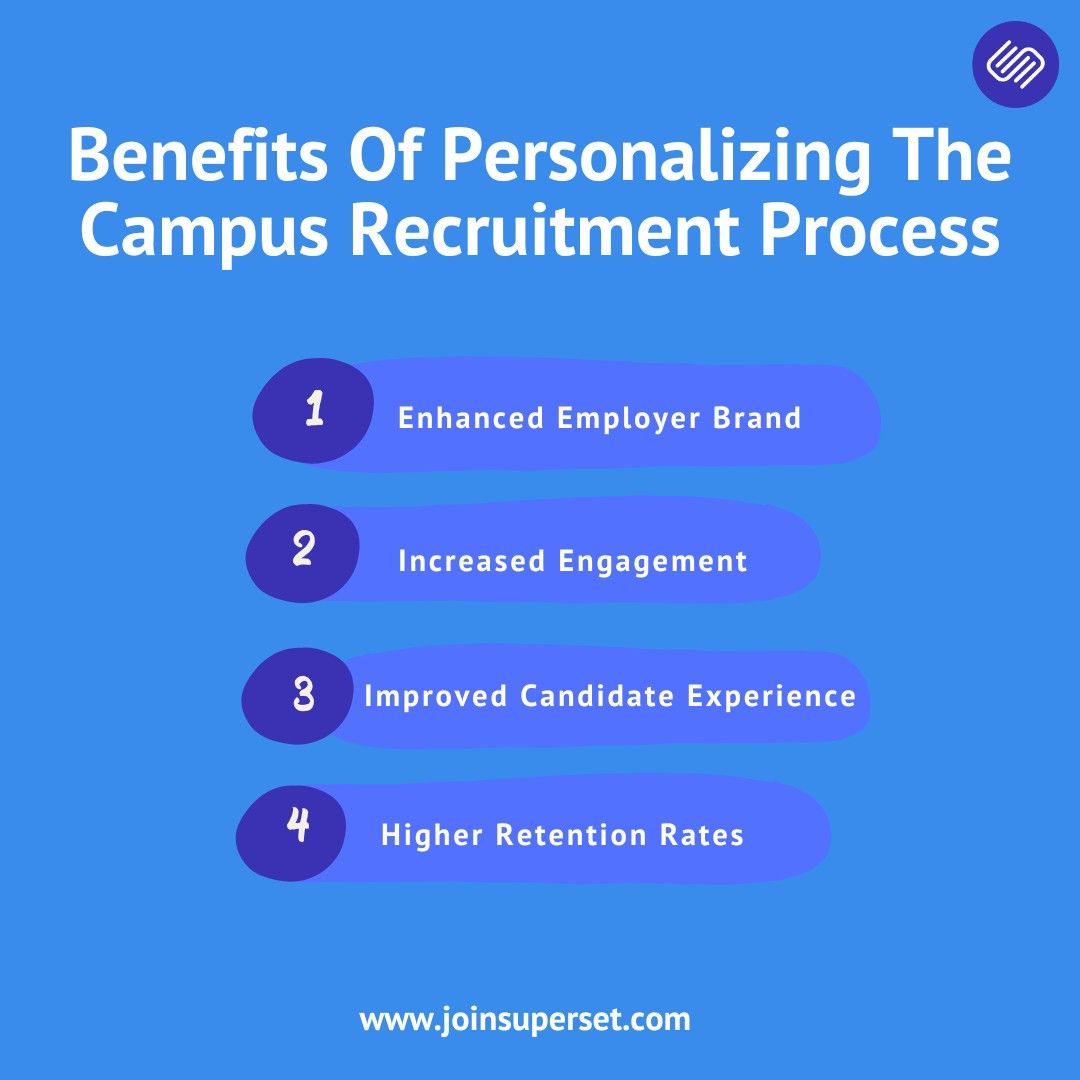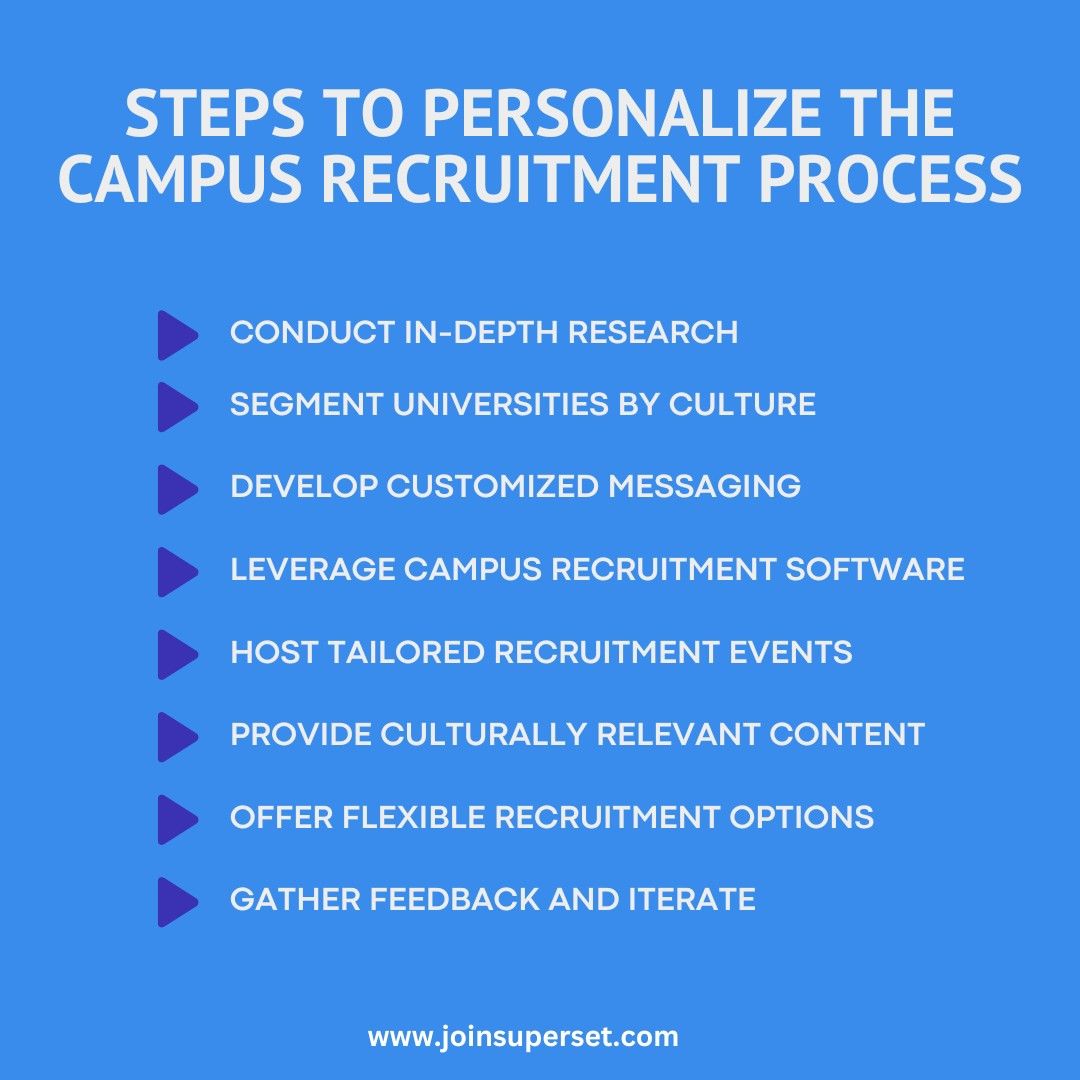In an era where the job market is more competitive than ever, the need to customize the campus recruitment process has become a fundamental requirement for companies striving to attract top university talent. Understanding and respecting the diverse cultures within these institutions can make a significant difference for companies aiming to attract top talent from universities. Each university has a unique culture, values, and traditions, which can deeply influence how students perceive potential employers. In this comprehensive guide, we’ll explore the importance of personalizing the campus recruitment process and provide actionable insights for companies and HR managers on how to effectively adapt their recruitment strategies to suit different university cultures. We’ll also discuss the role of campus recruitment software and campus recruitment automation in streamlining and enhancing these personalized approaches.
Understanding University Culture
University culture encompasses the shared values, traditions, norms, and behaviours that define the student body and academic environment of an institution. This culture is shaped by various factors, including the university’s history, geographical location, academic focus, and student demographics. Understanding these cultural differences is crucial for companies looking to build meaningful connections with students. A one-size-fits-all approach to campus recruitment may not resonate with all students, and can even alienate potential candidates. Instead, companies should strive to understand the unique aspects of each university’s culture and tailor their recruitment strategies accordingly.
The Importance of Personalization in Campus Recruitment
Personalizing the campus recruitment process involves adapting your recruitment strategies to align with the specific values, preferences, and expectations of students at different universities. This approach not only helps you attract the right talent but also demonstrates your commitment to understanding and respecting the diverse backgrounds of potential candidates.
Here are some key benefits of personalizing the campus recruitment process:

- Enhanced Employer Brand
Personalization allows you to position your company as a preferred employer among students by aligning your messaging with their values and aspirations. This can significantly enhance your employer brand on campus. - Increased Engagement
When students feel that a company understands and respects their unique culture, they are more likely to engage with that company during the campus recruitment process. This can lead to higher participation in recruitment events and more applications from top candidates. - Improved Candidate Experience
Personalization helps create a positive candidate experience by ensuring that students feel valued and understood. This can increase the likelihood of candidates accepting job offers and becoming loyal employees. - Higher Retention Rates
Employees who feel that their company values diversity and inclusivity are more likely to stay with the organization long-term. By personalizing the recruitment process, you can attract candidates who are a better cultural fit for your company, leading to higher retention rates.
Steps to Personalize the Campus Recruitment Process
To effectively personalize your campus recruitment process, it’s important to take a strategic approach that incorporates both research and technology. Here are some steps you can follow to tailor your recruitment strategies to different university cultures:

- Conduct In-Depth Research:
- Before engaging with a university, conduct thorough research to understand its unique culture, values, and student demographics. This can involve reviewing the university’s mission statement, exploring its social media channels, and speaking with current students or alumni.
- Identify key cultural aspects, such as the university’s academic focus, extracurricular activities, and student organizations. This will help you tailor your messaging and recruitment events to resonate with the student body.
- Segment Universities by Culture:
- Group universities into segments based on shared cultural traits. For example, you might create segments for liberal arts colleges, large public universities, and tech-focused institutions. This will allow you to develop targeted recruitment strategies for each segment.
- Consider factors such as the university’s size, location, academic reputation, and student body composition when creating these segments.
- Develop Customized Messaging:
- Craft personalized messaging that speaks to the values and aspirations of students at each university. This can involve highlighting aspects of your company that align with the university’s culture, such as your commitment to sustainability, innovation, or diversity.
- Use campus recruitment software to automate the distribution of customized messages across different platforms, such as email campaigns, social media, and university job boards.
- Leverage Campus Recruitment Software:
- Campus recruitment software can play a crucial role in personalizing the recruitment process by allowing you to manage and track your interactions with different universities.
- Use campus recruitment automation to streamline repetitive tasks, such as sending follow-up emails or scheduling interviews. This will free up your time to focus on building meaningful connections with students.
- Host Tailored Recruitment Events:
- Organize recruitment events that reflect the unique culture of each university. For example, if you’re recruiting at a university with a strong focus on environmental sustainability, consider hosting a green-themed recruitment event that highlights your company’s eco-friendly initiatives.
- Engage with student organizations and campus leaders to co-host events that align with their interests. This can help you build credibility and trust with the student body.
- Provide Culturally Relevant Content:
- Develop content that resonates with the specific interests and values of students at each university. This can include blog posts, videos, and social media content that showcase your company’s alignment with the university’s culture.
- Use data from your campus recruitment software to analyze which types of content are most effective at engaging students from different universities. This will allow you to continuously refine your content strategy.
- Offer Flexible Recruitment Options:
- Different universities may have different preferences when it comes to recruitment formats. Some may prefer in-person events, while others may favour virtual recruitment drives. Be flexible in your approach and offer multiple options to accommodate the needs of different universities.
- Campus recruitment automation can help you manage both in-person and virtual recruitment events by automating tasks such as event registration, reminders, and post-event follow-ups.
- Gather Feedback and Iterate:
- After each recruitment cycle, gather feedback from students, university career centres, and your recruitment team to assess the effectiveness of your personalized strategies. Use this feedback to make data-driven improvements to your campus recruitment process.
- Continually monitor the performance of your campus recruitment software and automation tools to ensure they are effectively supporting your personalization efforts.
The Role of Campus Recruitment Automation in Personalization
Campus recruitment automation is a powerful tool that can help you efficiently personalize your recruitment process across multiple universities. By automating repetitive tasks, you can free up time to focus on building meaningful connections with students and tailoring your strategies to align with different university cultures.
Here are some key ways campus recruitment automation can support personalization:
- Automated Communication: Campus recruitment automation allows you to send personalized messages to students at different universities based on their preferences and interests. This can include automated email campaigns, SMS notifications, and social media posts.
- Data-Driven Insights: Campus recruitment software can provide valuable insights into student behaviour and preferences, allowing you to tailor your recruitment strategies accordingly.
- Streamlined Event Management: Automate the scheduling, registration, and follow-up processes for recruitment events, ensuring that each event is tailored to the unique culture of the host university. This can include sending personalized invitations, reminders, and post-event surveys.
- Customized Application Processes: Use campus recruitment automation to create customized application processes for students from different universities. This can include tailoring the application forms, interview questions, and assessment criteria to align with the specific skills and values of students at each university.
- Scalability: Campus recruitment automation allows you to scale your personalized recruitment efforts across multiple universities without sacrificing quality. This is particularly important for companies that recruit from a large number of universities with diverse cultures.
Measuring the Success of Your Personalized Recruitment Strategy
Once you have implemented a personalized campus recruitment strategy, it’s important to measure its effectiveness. By analyzing key performance indicators (KPIs), you can determine what’s working and where there might be room for improvement. Here are some KPIs to consider:
- Application Rate: Monitor the number of applications received from each university. An increase in applications from a particular university may indicate that your personalized approach is resonating with students.
- Engagement Rate: Track student engagement with your recruitment campaigns, including open rates for emails, participation in recruitment events, and interactions on social media. Higher engagement rates typically suggest that your messaging is effectively connecting with students.
- Offer Acceptance Rate: Measure the percentage of candidates who accept job offers. A higher acceptance rate indicates that students feel a strong alignment between your company’s culture and their values, which can often be attributed to a personalized recruitment approach.
- Retention Rate: Evaluate the retention rate of employees hired through your campus recruitment efforts. High retention rates suggest that your personalized campus recruitment process is successfully attracting candidates who are a good cultural fit for your company.
- Feedback from University Partners: Solicit feedback from university career centres and student organizations to gain insights into how your recruitment strategies are perceived on campus.
Best Practices for Implementing a Personalized Campus Recruitment Process
To maximize the effectiveness of your personalized campus recruitment process, consider the following best practices:
- Stay Updated on University Trends: University cultures can evolve, so it’s important to stay informed about changes in student values, interests, and behaviours. Regularly update your research and adjust your recruitment strategies accordingly.
- Foster Long-Term Relationships: Building strong, long-term relationships with universities and student organizations can enhance your reputation and make it easier to recruit top talent. Consider offering ongoing support, such as sponsoring events or providing scholarships, to maintain a positive presence on campus.
- Prioritize Diversity and Inclusion: When personalizing your recruitment process, ensure that you are also promoting diversity and inclusion. Tailor your messaging to appeal to a wide range of students and create opportunities for underrepresented groups to engage with your company.
- Utilize Data Analytics: Leverage the data provided by your campus recruitment software to continuously refine your strategies. By analyzing trends and patterns, you can identify what works best for different universities and optimize your recruitment efforts.
- Be Authentic: While personalization is key, it’s also important to remain authentic in your recruitment efforts. Students can easily detect insincerity, so ensure that your messaging and actions genuinely reflect your company’s values and culture.
Conclusion
Personalizing the campus recruitment process is essential for companies looking to attract top talent from a diverse range of universities. By understanding the unique cultures of different institutions and leveraging campus recruitment software and automation, you can tailor your strategies to resonate with students and build strong connections that lead to successful hires. Remember, personalization is not a one-time effort but an ongoing process that requires continuous adaptation and refinement. By staying committed to understanding and respecting the diverse backgrounds of university students, your company can position itself as an employer of choice and secure the best talent for the future.







